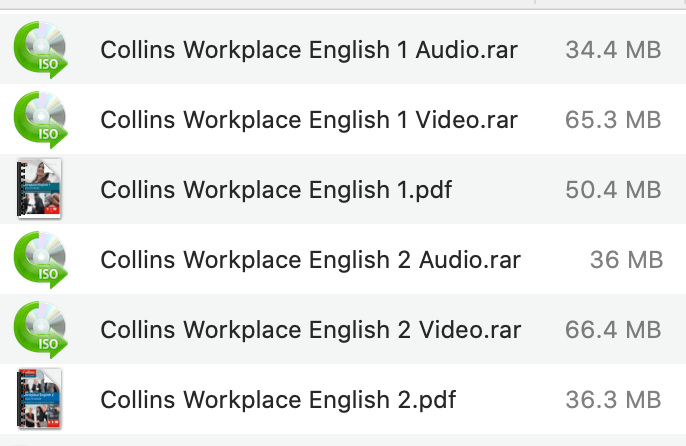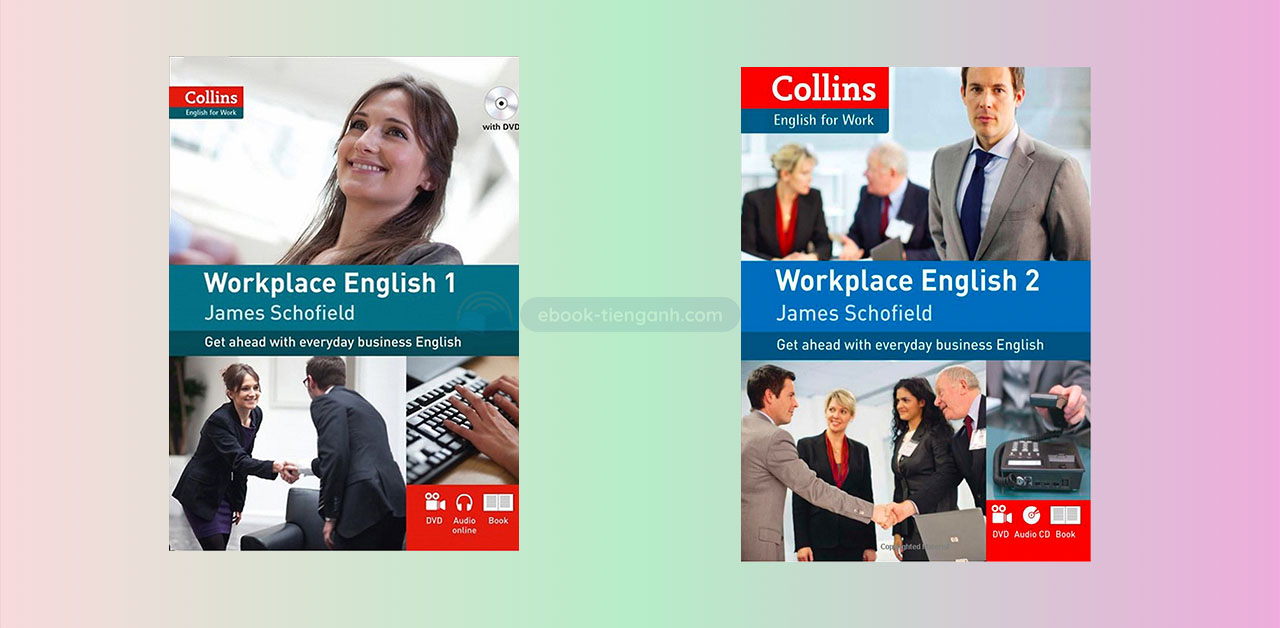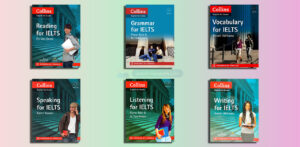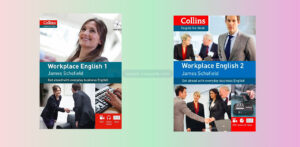Workplace English
Level 1
Collins Workplace English 1.pdf – Sample: Click
Collins Workplace English 1 Video.rar
Collins Workplace English 1 Audio.rar
Level 2
Collins Workplace English 2.pdf – Sample: Click
Collins Workplace English 2 Video.rar
Collins Workplace English 2 Audio.rar
✅ Get Workplace English (all files): $5 for all files
๏ Make the payment here: Click here
Gain access to download all resources on our website, including everything: PDFs, Audio, Video, Software, Presentation Plus, ActiveTeach IWB, Classroom Presentation Tool, iTools… for only 333 USD.
๏ You will have lifetime, unlimited access.
๏ We still continuously update resources daily.
๏ Register today at the best price.
๏ Contact us for more details (email: [email protected])
Overview of the “Collins English for Work: Workplace English”
Contents
- 1 Overview of the “Collins English for Work: Workplace English”
- 2 Who is suitable for ‘Collins English for Work: Workplace English’?
- 3 The benefits of ‘Collins English for Work: Workplace English’
- 4 Effective teaching and learning strategies for ‘Collins English for Work: Workplace English’
- 5 Top 14 English Language Series for Professionals: Best Alternatives to Collins English for Work: Workplace English
| ✅ Coursebook: | Collins English for Work: Workplace English |
| ✅ Publisher: | Collins |
| ✅ For: | Adult, Business |
| ✅ Levels: | A1, A2 |
| ✅ Publication year: | 2012 |
“Collins English for Work: Workplace English” is a series of self-study packs designed to help individuals improve their English language skills in a professional workplace context. There are two levels available: Workplace English 1 (A1-A2) and Workplace English 2 (A2). These self-study packs are authored by James Schofield and focus on different characters in workplace settings to teach learners the language and skills needed for everyday work life.
Workplace English 1: A1-A2 (Collins English for Work):
- This level is suitable for learners at CEF (Common European Framework) level A1/Elementary.
- The main character in this level is Jasmine Goodman, a personal assistant. The pack follows her daily life at her office, where she answers the phone, writes emails, manages her boss’ schedule, and takes care of visitors.
- Learners can watch or listen to Jasmine in various business situations using downloadable videos and audio to learn the language specific to the workplace.
- The pack includes practice activities to make learning engaging and interactive.
- Key phrases and vocabulary from the lessons can be applied to one’s own work life.
- The full-color book contains 24 units and a reference section with key words and phrases, an answer key, audioscript, pronunciation guide, and example emails.
Workplace English 2: A2 (Collins English for Work):
- This level is designed for learners at CEF level A2 (Pre-intermediate).
- The central character in this level is Tom Field, a project manager at Lowis Engineering. The pack explores Tom’s daily work life, including attending meetings, giving presentations, participating in video and phone conferences, and writing emails for various business situations.
- Learners can watch or listen to Tom in different business contexts to learn the language of business.
- Like the first level, there are practice activities to reinforce learning, and key phrases can be applied to one’s professional life.
- Units in this level cover topics such as giving presentations, assigning tasks, teleconferencing, video conferencing, emailing, and conducting small talk.
- The pack includes twelve videos featuring different business situations and audio content with conversations and exercises.
- The full-color book for this level contains 24 units and a reference section with key words, phrases for speaking and writing, an answer key, audioscript, and a grammar reference.
Both levels of “Collins English for Work: Workplace English” aim to help learners build confidence and proficiency in using English in the workplace, focusing on practical skills and real-life scenarios encountered in professional settings.
Who is suitable for ‘Collins English for Work: Workplace English’?
“Collins English for Work: Workplace English” is suitable for individuals who want to improve their English language skills specifically in the context of the workplace. The series is designed for learners at different proficiency levels, and the specific suitability depends on the learner’s current English language level and their professional needs. Here’s a breakdown:
Workplace English 1 (A1-A2):
- Suitable for learners at CEF (Common European Framework) level A1 or Elementary.
- Ideal for individuals who are just starting to learn English or have very basic knowledge of the language.
- Designed for those who want to acquire essential English skills for basic workplace communication, such as answering the phone, writing emails, managing schedules, and interacting with visitors in a professional setting.
Workplace English 2 (A2):
- Designed for learners at CEF level A2, which is considered Pre-intermediate.
- Suitable for individuals who have progressed beyond the absolute beginner stage and have some familiarity with English.
- Intended for learners who want to build on their basic English skills and communicate more confidently in workplace situations, including meetings, presentations, conferences, and email communication.
In summary, “Collins English for Work: Workplace English” is suitable for a range of learners, from beginners with little English knowledge to those with a basic foundation looking to improve their language skills for professional purposes. It provides practical language and skills relevant to various workplace scenarios, making it a valuable resource for individuals who wish to enhance their communication abilities in an employment context.
The benefits of ‘Collins English for Work: Workplace English’
“Collins English for Work: Workplace English” offers several benefits for learners looking to improve their English language skills in a professional context. Here are some of the key advantages of using this self-study pack:
- Tailored for the Workplace: The series is specifically designed to help learners develop language skills and communication abilities relevant to various workplace scenarios, ensuring that the content is practical and applicable to real-life professional settings.
- Progressive Learning: The series offers different levels, from A1 to A2, allowing learners to start at their current proficiency level and progress as they become more confident and proficient in using English at work.
- Engaging Content: The packs feature characters who work in typical office environments, providing relatable situations that engage learners and make the learning experience more enjoyable.
- Multimedia Resources: The inclusion of downloadable videos and audio content allows learners to listen to and watch workplace conversations and situations, enhancing their listening and speaking skills.
- Practice Activities: Each pack contains practice activities that reinforce learning and help learners apply the language and skills they’ve acquired in practical exercises.
- Key Phrases and Vocabulary: The packs offer essential key phrases, vocabulary, and expressions commonly used in the workplace, enabling learners to build a strong foundation for effective communication.
- Grammar and Pronunciation Support: The reference sections in the packs include grammar explanations, pronunciation guides, and audioscripts, helping learners improve their grammar and pronunciation skills.
- Flexibility: The self-study packs are designed for self-paced learning, allowing individuals to study at their own convenience, making it suitable for busy professionals.
- Real-life Application: Learners can immediately apply what they’ve learned to their daily work life, making the content practical and beneficial for career development.
- Confidence Building: By providing the tools and language needed for successful workplace communication, the series helps learners build confidence in using English in professional settings.
- Cultural Awareness: Learners gain insights into English-language workplace culture, etiquette, and communication norms, which can be valuable when working with international colleagues or clients.
- Certification and Career Advancement: For learners seeking to enhance their resume or advance in their careers, improved English language skills can open up new opportunities and make them more competitive in the job market.
In conclusion, “Collins English for Work: Workplace English” offers a comprehensive and practical approach to learning English for professional purposes. It equips learners with the skills and confidence they need to communicate effectively in the workplace, potentially leading to career growth and success.
Effective teaching and learning strategies for ‘Collins English for Work: Workplace English’
Effective teaching and learning strategies for “Collins English for Work: Workplace English” can vary depending on whether you are a teacher or a self-learner. Here are strategies tailored to both scenarios:
For Teachers:
- Assessment of Learner Levels: Before starting the course, assess the English proficiency levels of your students. This will help you place them in the appropriate level of the “Workplace English” series.
- Clear Learning Objectives: Establish clear learning objectives for each lesson or unit. Clearly communicate what students should be able to do or know by the end of each session.
- Structured Lesson Plans: Create structured lesson plans that follow the content of the series. Include activities, exercises, and discussions to reinforce the learning objectives.
- Use of Multimedia: Make the most of the downloadable videos and audio content. Use these resources for listening comprehension activities, role plays, and pronunciation practice.
- Interactive Activities: Incorporate interactive activities such as group discussions, pair work, and role-playing based on the workplace scenarios presented in the series.
- Real-life Simulations: Organize workplace simulations or role-plays to help students practice using English in authentic professional situations.
- Regular Practice: Assign homework and regular practice exercises to reinforce what students have learned in class. Encourage self-study using the materials provided in the self-study packs.
- Feedback and Assessment: Provide constructive feedback on students’ language use, pronunciation, and comprehension. Use formative assessments to track progress.
- Cultural Insights: Discuss cultural aspects of workplace communication, as understanding cultural differences is crucial for effective communication in an international work environment.
- Encourage Discussion: Encourage students to discuss their own workplace experiences and challenges in English, fostering a learner-centered approach.
- Flexibility: Adapt the course to your students’ specific needs and interests within the workplace context.
For Self-Learners:
- Set Clear Goals: Define your goals and objectives for improving your workplace English. Knowing what you want to achieve will help you stay motivated.
- Consistent Study Schedule: Establish a regular study routine to ensure consistent progress. Allocate specific times for learning and practice.
- Use Multimedia Resources: Make full use of the downloadable videos and audio content. Practice listening and speaking along with the characters in the series.
- Interactive Learning: Engage in interactive activities and practice exercises provided in the self-study packs to reinforce your understanding.
- Regular Practice: Consistently practice key phrases and vocabulary in your own work life to apply what you’ve learned.
- Self-assessment: Use the answer keys and self-assessment tools in the packs to gauge your progress and identify areas that need improvement.
- Join Online Communities: Participate in online forums or communities related to English learning to interact with others and seek help or feedback.
- Keep a Learning Journal: Maintain a journal to track your progress, jot down new phrases, and note areas where you need additional practice.
- Language Exchange: Consider finding a language exchange partner who is a native English speaker or someone looking to practice English. This can provide valuable conversational practice.
- Stay Motivated: Keep your motivation high by setting achievable short-term goals and rewarding yourself when you achieve them.
Both teachers and self-learners should adapt these strategies to their specific learning styles and needs. Consistency, practice, and a focus on real-world application are key to mastering workplace English with the “Collins English for Work: Workplace English” series.
Top 14 English Language Series for Professionals: Best Alternatives to Collins English for Work: Workplace English
If you’re looking for alternatives to “Collins English for Work: Workplace English,” which is designed to help learners improve their English language skills in a professional context, here are several other series that focus on English for specific purposes, particularly in the workplace:
- “Business Result” by Oxford: This series offers practical skills and language for workplace communication, including speaking, writing, and listening tasks relevant to real business situations.
- “Market Leader” by Pearson Longman: Combining the expertise of the Financial Times with rigorous language training, this series focuses on contemporary business topics and includes authentic texts and case studies.
- “In Company” by Macmillan: Tailored for professional adults who need to communicate in English at work, this series uses a task-based approach and includes real workplace scenarios to develop both language and practical business skills.
- “English for International Tourism” by Pearson Longman: For those working in the tourism industry, this series provides rich content that helps improve communication skills in professional travel, hospitality, and tourism contexts.
- “Professional English in Use” Series by Cambridge: This series covers various sectors such as Medicine, Law, ICT, and Finance, offering detailed language and vocabulary for professionals in these fields.
- “Business Benchmark” by Cambridge: Tailored for students preparing for Business English exams like BEC or BULATS, this series provides language practice and exam preparation in the context of business.
- “Business English Handbook” by Paul Emmerson: An advanced business language book, focusing on students aspiring to be or already in senior positions; it covers complex topics in business and finance with comprehensive language support.
- “English for Business Communication” by Cambridge: This series focuses on building communication skills in business situations, with exercises designed to develop speaking and writing capabilities alongside key vocabulary.
- “Global Business Class” by National Geographic Learning: Designed for working professionals, this series integrates stunning National Geographic content, focusing on developing communication skills through real-world business contexts.
- “English for Everyone: Business English” by DK: This series is structured in a very accessible way, using visuals and graphics to explain concepts. It covers business communication essentials such as writing reports, managing conversations, and preparing for interviews.
- “Intelligent Business” by Pearson: Uses authentic materials from The Economist magazine for contextual learning and applies a systematic approach to learning business English, suited for both classroom and self-study.
- “Absolute Financial English” by Delta Publishing: Specifically designed for finance professionals, this book includes training for all four language skills, focused on topics such as budgeting, corporate strategy, and financial reporting.
- “Career Paths” Series by Express Publishing: This collection of books is unique in its focus on specific careers (e.g., Engineering, Medicine, Information Technology), providing vocabulary and language exercises directly related to job-specific tasks and scenarios.
- “Oxford English for Careers” by Oxford: A series designed to meet the language needs of those in vocational education or in a working environment, focusing on industry-specific vocabulary and workplace scenarios.
These series provide robust support for developing English language skills in professional settings, offering a mix of practical application and rigorous training suitable for workplace communication and specialized areas within various industries.







